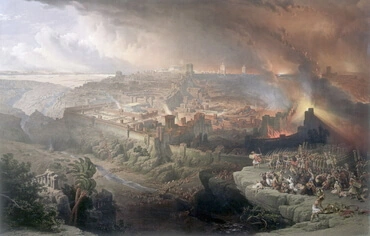14
patrokselaiset, kasluhilaiset, joista filistealaiset ovat lähteneet, sekä kaftorilaiset.
14
patrokselaiset, kasluhilaiset, joista filistealaiset ovat lähteneet, sekä kaftorilaiset.
1167. In the Word 'Canaan' or the Canaanite means forms of ritual or external worship separated from internal. This is clear from very many places, especially in historical sections. This being the character of the Canaanites at the time that the sons of Jacob were brought into the land, permission was given to wipe them out. But in the internal sense of the Word Canaanites are used to mean all people whose worship is external separated from internal. And because this was pre-eminently true of the Jews and Israelites, they specifically are meant in the prophetic Word, as becomes clear from the following two places alone: In David,
They poured out innocent blood, the blood of their sons and daughters, whom they sacrificed to the idols of Canaan; and the land was profaned with blood. 1 They became unclean by their acts, and committed whoredom in their doings. Psalms 106:38-39.
Here 'pouring out the blood of sons and daughters' means in the internal sense that they destroyed every truth of faith and good of charity. 'Sacrificing sons and daughters to the idols of Canaan' means profaning matters of faith and charity by means of external worship separated from internal, which is nothing else than idolatrous worship. So 'they became unclean by their acts and committed whoredom in their doings'. In Ezekiel,
Thus said the Lord Jehovih to Jerusalem, Your tracings and your nativity are of the land of Canaan. Your father was an Amorite and your mother a Hittite. Ezekiel 16:3.
Here it is stated explicitly that they belonged to the land of Canaan. As regards 'Canaan' meaning external worship separated from internal, see what has appeared already in 1078, 1094.
Poznámky pod čarou:
1. literally, bloods

In the ancient world cities were nearly nations unto themselves – they existed within walls, with their own laws and customs, generally centered on the common purpose of trade. This is not as much the case in the modern world, but we still tend to divide ourselves city by city in terms of sports teams, accents, music and culture, and still tend to generalize the character of people from other cities. It follows, then, that in the Bible cities represent various doctrines – collections of inter-related ideas about spiritual reality. Such doctrines can be based on anything from the Lord’s true teachings – the New Jerusalem seen by John in Revelation – to the falsity and heresy of Sodom and various cities obliterated by the people of Israel at God’s command. On the most personal level, a city can also represent the natural mind of one person – which makes sense since we each to some extent have our own doctrine and our own set of ideas and beliefs.